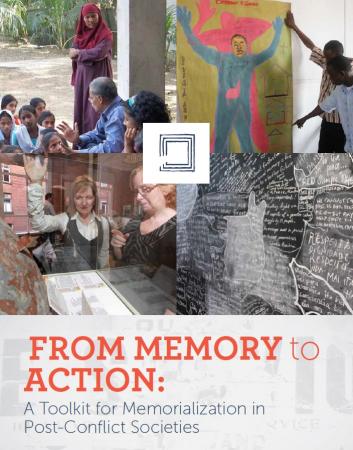From Memory to Action: A Toolkit for Memorialization in Post-Conflict Societies

“Following periods of protracted conflict and gross human rights violations, societies use a variety of mechanisms to come to terms with the past. How to hold perpetrators accountable, how to recognize and ensure justice for the victims of conflict, and how best to rebuild a culture of human rights and democracy are some of the key questions that societies aim to address as they attempt to come to terms with the past. Questions of memory and memorialization are integral to how societies choose to understand the past in the present and how it affects the future.
In continuing their engagement with some of these issues, the African Sites of Conscience post-conflict thematic network met in Freetown, Sierra Leone in 2010 to share their experiences and efforts of memorialization in post-conflict settings… Participants observed that memorialization is increasingly becoming a significant aspect of post-conflict reconciliation and reconstruction processes; however, there was still limited understanding amongst initiators such as government and civil society about what processes can best achieve some of the broader goals of memorialization efforts. What is memorialization? How does one begin a memorialization project? Should memorialization be prioritized given other post-conflict development needs? How does one address the issue of monuments to past regimes of authoritarianism and repression? Who are the key stakeholders for a memorialization project?
Participants noted that many of the available resources on memorialization were limited to a specific field such as heritage or museum studies; further, those that do focus on post-conflict memorialization are limited to broad overviews of memorialization rather than an in-depth exploration of the challenges, successes and best practices related to memorialization in post-conflict settings. This toolkit aims to address this gap. One of the core guiding principles of the International Coalition is the emphasis that members place on reciprocal learning and the exchange of ideas and best practice. As such, the toolkit is a collaborative effort that draws on the work of members from a variety of post-conflict settings.” (p.8-9)
